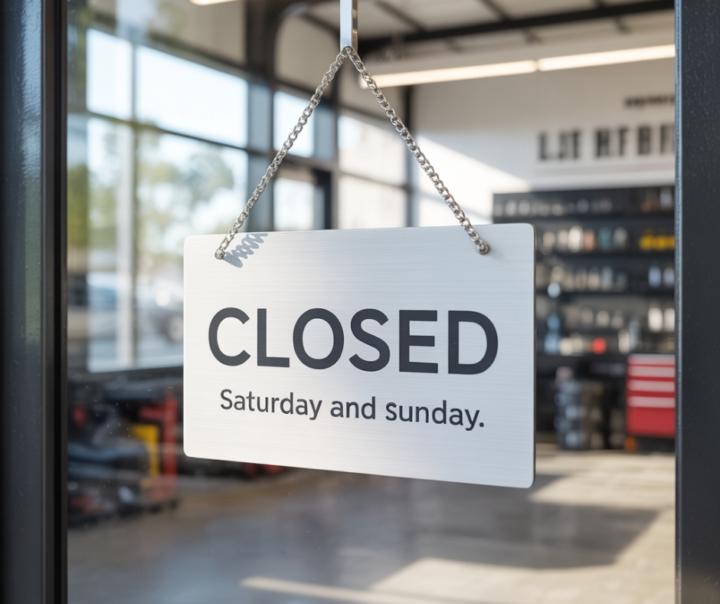
Write something
🔧 Swipe this. Save it. Post it. (dealers will hate you for this!)
The two images below are ready for your shop's Facebook page. Pick the one that feels right. Just one. HERE'S THE DESCRIPTION TEXT TO GO ALONG WITH THE IMAGE "We don't work weekends. That's time for family and the things you love. We want our employee's lives to work inside and outside of the shop." Here's your move: → Post it on your FB business page → Boost it for $20 — 10-mile radius → Come back here and tell us what happened This is passive recruiting. Stop telling technicians your culture is great. Show them. Every employed tech within 10 miles scrolling on Sunday will see it. Let that sink in. 👇

Your technicians are watching how you treat your customers
The mindset that gets a vehicle to 250,000 miles is the same one that builds a shop technicians never want to leave. Two Technician Find community members— @Brett Beachler and @Carm Capriotto —just dropped a conversation that every shop owner needs to hear. It's about vehicle maintenance on the surface. But underneath? It's about something bigger. Here's the pattern they exposed: Most shops treat maintenance as a series of isolated repairs. "Fix what's broken. Move on." And most shops treat hiring the same way. "Fill the seat. Move on." Both approaches fail for the same reason: They're reactive instead of strategic. The 250K Mile Mindset flips this completely: → From transactional service to advisory leadership → From fear-based selling to education-first communication → From chasing emergencies to building long-term relationships Sound familiar? It should. Because the shop that thinks in decades about customer vehicles is the same shop that thinks in decades about their team. Technicians notice this. They notice when your service advisor treats a customer like a partner—because that's how they want to be treated too. Culture isn't what you say. It's what you do, repeatedly, across every relationship in your shop. Watch Brett and Carm break this down: [LINK] Then ask yourself: Are you building 250K relationships with your technicians... or just fixing problems until the next breakdown?
2
0
The Technician In Your Head vs. The One Standing In Front of You
A lot of shop owners I talk to think they have a communication problem with their techs. They don't. They have a recognition problem. Here's what I mean: When you talk to "your technicians," you're not actually talking to them. You're talking to a generic technician you invented in your head—some composite of every tech you've ever met, blended with assumptions about "what techs want" you picked up from industry forums and podcast gurus. Meanwhile, the actual human being in front of you—with specific wiring, specific fears, specific motivators—hears something completely different than what you intended. And here's the kicker: when communication fails, most owners blame the tech. "He doesn't listen." "She's impossible to read." "I can't figure out what he wants." But here's a more uncomfortable truth: the person who controls the message controls the outcome. When you take full responsibility for 100% of a communication—what you say AND what your tech hears—you've mastered communication. Everything else is just hoping. THE SIX TECHNICIANS YOU'RE ACTUALLY MANAGING After analyzing hundreds of technician conversations, personality assessments, and retention patterns, I've identified six distinct technician types. Each one processes information differently, fears different things, and responds to completely different motivators. Get this wrong, and your best intentions land like criticism. Get this right, and your simplest feedback becomes fuel. Here they are: 👉THE DIAGNOSTIC HUNTER Core identity: "I'm not a parts changer. I solve the weird stuff." This tech lives for the complex diagnosis. Electrical gremlins. Intermittent faults. The car everyone else gave up on. When the whole shop is panicking, they're calm. What they're scanning for in every conversation: - "Do you respect diagnosis as paid work?" - "Will I be interrupted or trusted?" - "How do you handle comebacks and blame?" What makes them leave: Unpaid diag time. Guess-and-swap culture. Getting blamed for comebacks on cars where they weren't given time to verify. Constant "status update" interruptions mid-diagnosis.
2
0

"If you're not growing, you're dying."
I heard a shop owner say this recently. And the way he backs it up caught my attention. Most shop owners I know attend conferences, soak up information, get fired up about new ideas... then come home and open up the firehose on their team. "We're doing things differently now!" "Here's what I learned!" "Why isn't anyone as excited as I am?!" Sound familiar? Yeah, I do it too. But this owner does something different. He brings his entire team to conferences. Here's what he said: "When you invest in your team and bring them along, there's not a single team member stuck in the mud when you come back. Everyone is rowing in the same direction." No translation required. No resistance to "new ideas from the boss." No disconnect between what you learned and what they understand. I love seeing this at AAPEX/SEMA. Whole teams walking the floor together in their shop uniforms. Visiting trade booths as a unit. Eating meals together. Sitting in training rooms side by side. It's not just training anymore. It's team building. It's culture. It's alignment. Win. Win. Win. Here's my challenge: Pull up your calendar right now. Look at the conferences you've scheduled for this year. Is there one you could bring the team to? You'll be glad you did. And so will they.
3
0

"Great job, great job, great job, okay now you're fired."
Why Sometimes The Nicest Thing You Can Do For Your Team Might Feel Mean Alright, I'm just going to say it... Your "positivity" might be setting your team up for failure. I've heard this story dozens of times over the years: An employee at a shop gets let go—and they're completely blindsided. "I had no idea there was a problem." How does that happen? A few years back, I was working with a shop that had a young tech. Smart kid. Good hands. Showed up early. But he was paralyzed by the fear of making a mistake. Every diagnosis, he second-guessed himself. Every repair, he'd check and re-check. He'd hover near the service writer hoping someone would tell him he was doing okay. Nobody did. Not because they didn't think he was doing okay—but because they assumed he knew. "He's doing fine. Why would I need to say anything?" Meanwhile, this kid is drowning in silence. Interpreting "no feedback" as "I'm probably screwing up." He quit. Not because the job was too hard. Not because he wasn't capable. Because he couldn't stand the pressure of not knowing where he stood. A simple monthly 1-on-1 could have saved him. Here's the distinction many shop owners and managers miss: There's a difference between a coach and a cheerleader. A cheerleader says: "Great job! Great job! Great job!... Okay, you're fired." A coach says: "Here's what you're doing well. Here's what needs work. Here's how we're going to get you there." Cheerleaders make people feel good in the moment. Coaches make people feel secure—because they always know where they stand. When I onboard a new shop, I always ask: - What's your 1-on-1 meeting cadence? - What's your team meeting rhythm? - How do you remove obstacles for your people? - How do you get in front of problems so they don't cause drama in the shop? Most of the time? Crickets. Or else it's sporadic and inconsistent. And I get it. You're busy. You're in the weeds. You assume if something's wrong, they'll tell you. But here's the truth:

1-30 of 54

skool.com/technicianfind
Proven templates, strategies, training and top-level networking to help independent auto repair shops hire quality staff faster.
Powered by





